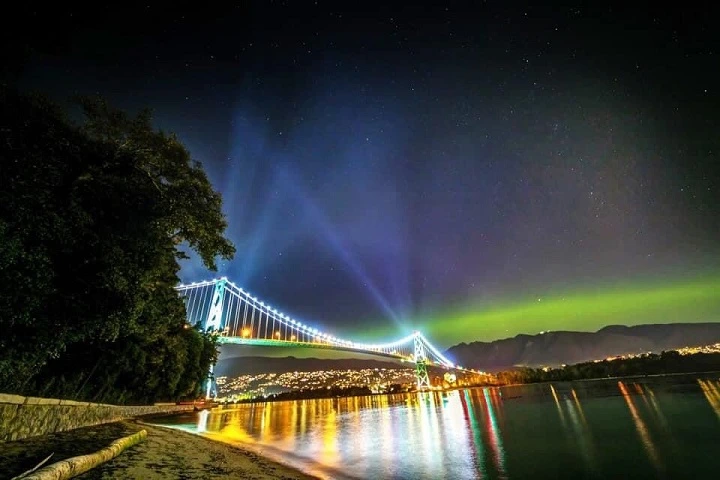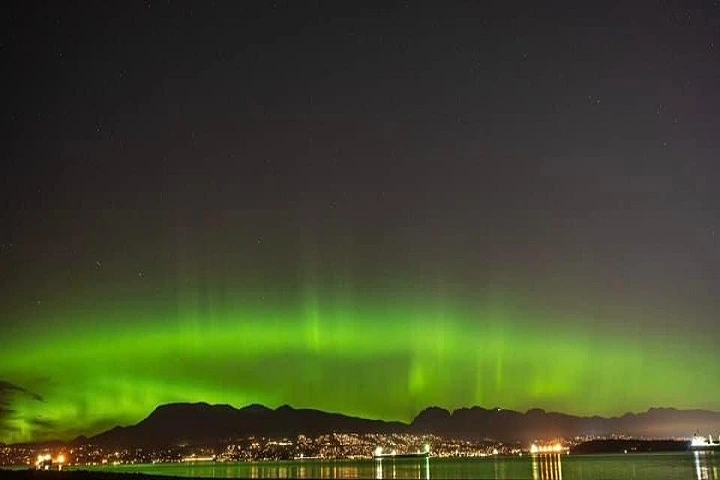People from all around the world are fascinated by the aurora, a natural phenomenon. While the Northern Lights (Aurora Borealis) and Southern Lights (Aurora Australis), which are most frequently seen in areas close to the Earth's poles, can sometimes be seen in other places, they are also occasionally seen there.
Vancouver, which sits on Canada's west coast, is not often thought of as one of the best places to see the aurora borealis. The city is less likely to regularly experience auroral activity due to its low latitude and proximity to the Pacific Ocean. But on a few rare occasions, Vancouverites and tourists were treated to breathtaking displays of the northern lights.

Vancouver residents occasionally get the opportunity to see the aurora borealis when solar activity is especially high and geomagnetic storms are powerful. The city's dark skies and the surrounding natural beauties offer a distinctive setting for witnessing the ethereal dance of lights during these infrequent occasions.
Away from city lights, in areas with less light pollution, is one of the best places to see the aurora in Vancouver. Just a short drive from Vancouver, locations like Cypress Mountain, Mount Seymour, or even Whistler provide darker skies and a better opportunity to see the dancing lights. While waiting for the aurora to appear, one can spend time at these locations immersed in the peace of nature.
It's crucial to remember that, in comparison to areas further north, aurora sightings in Vancouver are unpredictable and infrequent. It depends on solar activity, geomagnetic conditions, and atmospheric variables whether the aurora will be visible. Chances of seeing this celestial display in Vancouver might be increased by following space weather forecasts and keeping a watch on geomagnetic activity levels.

Vancouver itself has a lot to offer tourists in terms of attractions and activities, even if the northern lights are not visible. The city has a lot to offer, from its breathtaking coastal vistas and gorgeous mountains to its thriving cultural scene and numerous culinary options. There are countless chances for adventure and amusement in Vancouver, whether it is exploring Stanley Park, wandering through the storied Gastown neighbourhood, or taking in the colourful Granville Island Market.
Vancouver may not be known as an aurora hotspot, but when they do show up occasionally, the northern lights give an already magical city a special touch. Vancouver promises a unique experience that mixes urban sophistication with the splendour of nature, whether or whether one is fortunate enough to see the aurora borealis.
For a free,no-obligation,consultation simply emails us your details and requirements to info@globalduniya.ca and we will get straight back to you with some ideas and suggestions.
If you like my ideas for a tour we can comeup with a more detailed plan, by email or phone at +17788821450,before you decide.
Q1: How often can the Aurora Borealis be seen in Vancouver?
A1: The Aurora Borealis is a rare sight in Vancouver due to its low latitude and proximity to the Pacific Ocean. However, during periods of intense solar activity and geomagnetic storms, it is possible to witness the northern lights in Vancouver.
Q2: Where are the best locations near Vancouver to view the Aurora Borealis?
A2: Away from the city lights, areas with minimal light pollution, such as Cypress Mountain, Mount Seymour, and Whistler, provide better opportunities to see the aurora in Vancouver.
Q3: What factors contribute to the visibility of the Aurora Borealis in Vancouver?
A3: The visibility of the Aurora Borealis in Vancouver is influenced by solar activity, geomagnetic conditions, and atmospheric factors. Monitoring space weather forecasts and geomagnetic activity levels can help increase the chances of witnessing the northern lights.
Q4: Are there any specific times of the year when the Aurora Borealis is more likely to be visible in Vancouver?
A4: While there is no specific time of year when the aurora is more likely to be visible in Vancouver, geomagnetic storms are more common during the equinoxes (March and September). These periods may offer slightly higher chances of witnessing the northern lights.
Q5: What other attractions can visitors enjoy in Vancouver if they don't see the Aurora Borealis?
A5: Vancouver offers a wide range of attractions and activities even if the aurora is not visible. Visitors can explore Stanley Park, visit the historic Gastown district, enjoy the vibrant Granville Island Market, or engage in outdoor activities like hiking, skiing, and exploring the surrounding natural beauty. The city's diverse culinary scene and cultural events also provide plenty of entertainment options.